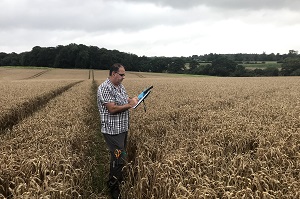EIT Food-funded project enables farmers to better understand and get the best value out of their fields.
Farmers could benefit from their big data to help them reduce the environmental impact of fertilisers while maintaining quality yields and profits of wheat thanks to a new research project developed at the University of Reading.
The EIT Food co-funded LINKDAPA project (LINKing multi-source Data for Adoption of Precision Agriculture) provides arable farmers with a low-cost, simple way to use big data to help highlight areas of their fields that are likely to give higher yields and grain protein content. EIT Food, the world’s largest and most dynamic food innovation community, is supported by the European Institute of Innovation and Technology (EIT), a body of the European Union.
Now in its second year, the partnership sees the University of Reading working with other academic institutions and agriculture firms. The resulting collaboration has meant that researchers are able to spatially predict grain protein and deliver highly detailed grain protein maps of fields during the growing season. These predictions will enable farmers growing bread-making wheat to target nitrogen fertiliser to areas that will best respond to it, saving farmers money and reducing their environmental impact. Predictions are being validated both by manual sampling and using proprietary NIR Protein Sensor hardware from John Deere.
Prof John Hammond, Professor of Crop Science at the University of Reading said:
“The recent hike in nitrogen fertiliser prices has sharpened minds on their use for the 2022 harvest and ways of optimising applications. With our LINKDAPA project developed at the University of Reading, farmers could benefit from big data and new technology to help them reduce the environmental impact and cost of fertilisers, while maintaining quality yields and profitability.
“LinkDAPA puts big data in reach for farmers to help them make better decisions about how they manage their crops. The benefits are not just felt for farmers, there is huge potential to reduce excess fertiliser usage and help to protect our environment while maintaining food production and the farmer’s bottom line.”
Dr Lindsay Todman, Lecturer in Agricultural Modelling at the University of Reading said:
“These new sensors allow us to understand how the protein content of wheat is varying across the field in a new level of detail. This will give us to better understanding of the reasons for the variability, such as how it relates to yield, the nitrogen applied and other properties such as soil factors and location in the field.
“We are developing protein predictions for winter wheat that will allow the last nitrogen application of the season be targeted to improve the chance of achieving bread quality grain, without wasting resources. This should help farmers grow profitable wheat crops by minimising input costs and achieving a premium, whilst also minimising negative environmental impacts of fertilisers.”
Commercial partner, Agricolus, is co-creating with UK, German and Italian farmers a computer software platform. The platform uses a farmer’s big data and the algorithms being developed at Reading and Hohenheim universities to create field maps. These maps predict the potential yield and grain quality (protein) variation as well as probabilities that yield/quality will exceed farmer specified thresholds. These predictions are then used to generate prescription maps for variable rate nitrogen fertiliser applications.
The project has been developed in partnership between the University of Reading, University of Hohenheim, Germany, and agriculture firms John Deere and Agricolus. EIT Food is co-funded by the European Union.
About EIT Food

LinkDAPA is a project under the support of EIT Food. EIT Food is the world’s largest and most dynamic food innovation community. We accelerate innovation to build a future-fit food system that produces healthy and sustainable food for all.
Supported by the European Institute of Innovation and Technology (EIT), a body of the European Union, we invest in projects, organisations and individuals that share our goals for a healthy and sustainable food system. We unlock innovation potential in businesses and universities, and create and scale agrifood startups to bring new technologies and products to market. We equip entrepreneurs and professionals with the skills needed to transform the food system and put consumers at the heart of our work, helping build trust by reconnecting them to the origins of their food.
We are one of eight innovation communities established by the European Institute for Innovation & Technology (EIT), an independent EU body set up in 2008 to drive innovation and entrepreneurship across Europe.
Find out more at www.eitfood.eu or follow us via social media: Twitter, Facebook, LinkedIn, YouTube and Instagram.

